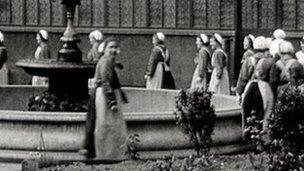Magdalene laundries support scheme unveiled
- Published

The laundries were Catholic-run workhouses in Ireland.
The Irish government is to pay survivors of Magdalene laundries at least 35m euros ($45m, £30m).
The laundries were Catholic-run workhouses where thousands of women and girls had to do unpaid, manual labour.
Payments will range from 11,500 euros (£9,000) for women who spent three months or less in a laundry, to a maximum of 100,000 euros (£85,000) for ten years or more.
Payment is not dependent on proof of hardship, injury or abuse.
Around 600 survivors are to receive forms by post to enable them to apply for redress.
The government expects the redress scheme to cost between 35m and 58m euros (£30m to £50m).
Support
Relatives of the deceased are not covered by the scheme, unless they had registered an expression of interest before 19 February 2013.
The package is based on recommendations by Mr Justice John Quirke, who was asked by the cabinet to devise eligibility criteria.
Mr Justice Quirke was asked for proposals to set up a scheme to compensate women and bring "healing".
The former residents of the laundries will also receive a range of supports, including an enhanced medical card and pension.
Any payments already made under the Residential Redress Scheme will not be taken into account.
Irish prime minister (taoiseach) Enda Kenny said on Tuesday night that the cabinet had discussed Mr Justice Quirke's report and accepted his recommendations.
Mr Kenny has formally apologised on behalf of the state for its role in the Magdalene laundries.
About 10,000 women passed through the laundries in the Irish Republic between 1922 and 1996, according to a report in February.
The laundries operated from the 18th to the late 20th Century.
- Published5 February 2013